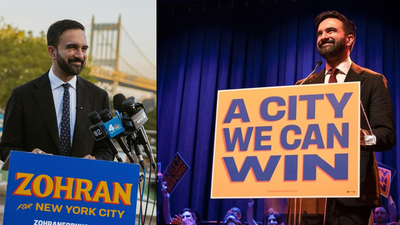
Socialist candidate Zohran Mamdani plans to abolish merit-based admissions in NYC schools
New York City's specialized public high schools, long regarded as one of the few bright spots in the city's struggling education system, may face a major overhaul under the potential leadership of socialist mayoral candidate Zohran Mamdani.
With Mamdani projected to win the Democratic mayoral primary, his plans to eliminate the Specialized High School Admissions Test (SHSAT) — the gateway to eight of the city's most prestigious selective high schools — have sparked intense debate about the future of merit-based education in the US's largest school district.These specialized high schools, including the Bronx High School of Science and Stuyvesant High School, have offered talented students from across the city an opportunity to escape underperforming local schools and attend some of the nation's top public high schools.
But Mamdani's socialist-leaning agenda, which extends beyond housing and wages to education reform, threatens to dismantle the exam system that many credit with maintaining academic excellence and diversity in these schools.Specialized high schools: a rare success story in NYC public educationThe city's eight specialized high schools admit students solely through the SHSAT, a test designed to select the most academically gifted students.
While New York City public schools often face criticism for overspending, lack of accountability, and overall dysfunction, these schools have consistently produced exceptional academic results. They provide opportunities for students from varied economic backgrounds, with roughly half of students at top schools like Stuyvesant and Bronx Science considered economically disadvantaged.
For example, 52 percent of Bronx Science students come from low-income families.However, the SHSAT has also drawn criticism for what opponents call racial bias. Asian students have historically scored highest on the test; in 2023, over two-thirds of Stuyvesant's student body was Asian. This has led critics to accuse the test of perpetuating segregation. Yet, as reported by Reason, Asian students in New York City also have the lowest median income among racial groups, challenging assumptions that specialized schools are dominated by affluent students.
Mamdani himself is an alumnus of Bronx Science and has acknowledged the segregation problem but insists the SHSAT must be abolished.Mamdani's challenge to merit-based admissionsAs quoted by Reason, Mamdani has stated, "I support measures to integrate our public schools and fully fund our education system, including the abolition of the SHSAT." His campaign focuses on implementing recommendations from the 2019 School Diversity Advisory Group, which call for eliminating gifted programs at elementary levels and halting new test-in schools.
Mamdani argues that ending the SHSAT will address systemic segregation and inequality in education.Yet critics warn that eliminating the SHSAT could harm talented students, particularly those from low-income families who rely on the merit-based test to access top-tier education. The current system already includes support programs for disadvantaged students who narrowly miss admission, such as summer study sessions that offer a second chance to gain entry.The risk of losing a proven pathway for talented studentsRemoving the SHSAT may not close achievement gaps but could instead reduce opportunities for many capable students. The exam provides a clear, standardized metric to identify academic talent across all neighborhoods and income levels. Without it, students from disadvantaged backgrounds might lose access to schools where they can learn among peers with similar abilities, limiting both their growth and chances for upward mobility.
Mamdani's plans, if enacted, would represent a significant shift in one of the most closely watched education systems in the US. While the goal of increased integration and equity is widely supported, education experts and advocates caution that dismantling a merit-based system without a proven alternative may do more harm than good. As Reason reported, the debate over New York City's specialized high schools highlights a broader national conversation about balancing fairness, diversity, and excellence in public education under the current US administration led by President Trump.

 6 hours ago
52
6 hours ago
52




























 English (US)
English (US)